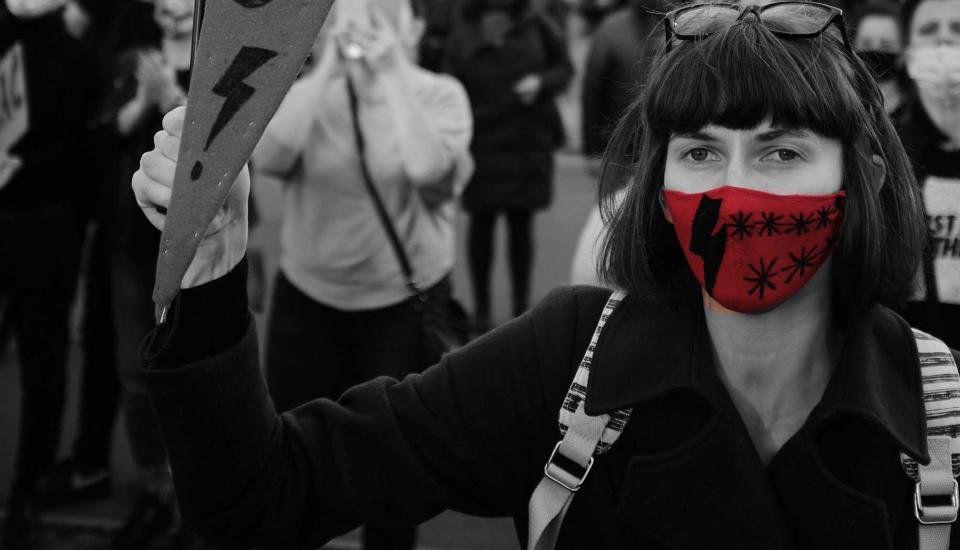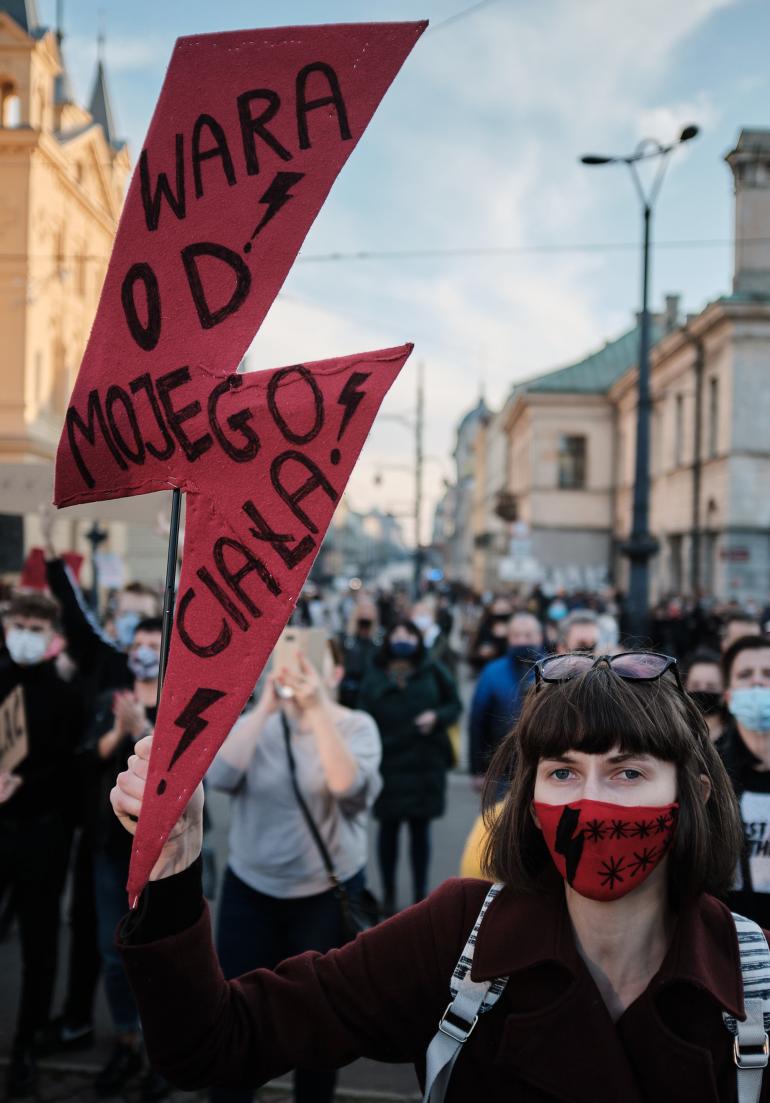
Image description: Woman holding sign. Image source: Photograph by Łódzkie Dziewuchy Dziewuchom.
“I think that online [protests] are equally important – maybe even more important now, because of the pandemic,” says Dominika Kasprowicz from Strajk Kobiet, a Polish women’s rights social movement campaigning against curbs to abortion access.
The group has been very active recently, both online and offline, fighting new and extreme changes to Poland’s abortion law.
In late October, the country’s Constitutional Tribunal ruled that abortions in Poland in cases where the foetus is severely deformed is unconstitutional, a move which will effectively ban abortion in the conservative country.
Poland already had one of the strictest abortion laws in Europe, with terminations previously allowed in three circumstances – if the pregnancy threatens the woman’s health or life, if pregnancy is the result of a criminal act, or if the foetus has serious birth defects. The latter case made up nearly all (98%) of Poland’s legal abortions, listed as the reason for 1074 out of 1110 abortions last year.
I think that online [protests] are equally important – maybe even more important now, because of the pandemic
Now, abortions will be almost impossible to access.
Since the ruling – and in the face of a government crackdown, right-wing thuggery, and the ongoing threat of the coronavirus pandemic – Poles have taken to the streets in droves, making up some of the largest protests seen in Poland since the fall of Communism.
Many demonstrations have been organised by Strajk Kobiet – which also arranged the famous ‘Black Protest’ four years ago against a similar abortion ban. After tens of thousands of women took part in that nationwide strike, the government deferred its proposal.
But this year, Strajk Kobiet have become more reliant on technology, and on the power of the internet, than ever before. And with the recent near-total ban, it’s more valuable than ever.
“We are doing everything through social media, through the internet,” says Kasprowicz. “Without the internet, it would be very difficult, almost impossible.”
Of course, this has intensified as a result of the coronavirus pandemic, but Strajk Kobiet have been deploying digital skills to drum up support on a far wider scale. The group use the internet to organise their protests – Kasprowicz explains that three main social media groups have been set up to coordinate their campaigning, bringing together the main organisers, as well as new supporters, and trusted confidants. As well as this, social media can reach into different areas of Poland to attract more campaigners, creating a network of protest organisers across Polish towns and villages. A blend of online groups, messenger apps, live feeds and social media channels allow quick and easy updates to details of protest – ensuring that, when demonstrations go ahead, protestors can be kept safe and informed.
A blend of online groups, messenger apps, live feeds and social media channels allow quick and easy updates to details of protest – ensuring that, when demonstrations go ahead, protestors can be kept safe and informed.
Support for the recent demonstrations has been high, according to poll data, and surveys also show many Poles (60%-70%) oppose the tribunal’s ruling, with only 10-15% calling for tougher abortion laws. As well as this, ruling party Law and Justice (PiS) has seen its polling fall since the tribunal’s decision.

Image description: Woman holding sign in protest in Łódź, 25th October 2020. Image source: Photograph by Łódzkie Dziewuchy Dziewuchom
Some commentators also see the ruling as an attempt by PiS to push through a ban without a political debate: the decision was made by Polish judges, but the constitutional court has been under the influence of PiS since 2016, when they appointed their own judges to the tribunal.
In fact, issues around women’s rights are part of a deteriorating situation for rule of law and democracy in Poland. Since PiS were elected in 2015, they have clamped down on media freedom, reformed the judiciary, and attacked minority groups – including the LGBTQ+ community. The sheer scale of protestors on Polish streets in recent weeks – in demonstrations which have attracted support from unlikely corners of Polish society, including from farmers and miners – suggests many Poles now feel the government has gone too far.
Even away from lively outdoor protests, demonstrations are also thriving online too. Strajk Kobiet’s distinctive lightning-bolt logo is easily spotted on Polish internet profiles and groups, whilst students have also used placards with the design to protest in Zoom classes.
Strajk Kobiet’s distinctive lightning-bolt logo is easily spotted on Polish internet profiles and groups, whilst students have also used placards with the design to protest in Zoom classes.
Recently, one designer, Michał Berger, also literally transported the protests from the streets to the internet by creating a ‘Strajk Font’, based on letters from handwritten banners used in demonstrations across Poland.
Kasprowicz says that youth protestors are one reason why Strajk Kobiet has embraced online organisation, in order to keep young people focused on the campaign. They are also inspired by information from teens and younger Poles in terms of which platforms to use for protest action.
But though the internet is a mobilising force and valuable addition to recent protests, Kasprowicz admits that sometimes it can do more harm than good. In the past, Kasprowicz says, “strong groups of local neo-Nazis” have changed their profile details to disguise themselves as Strajk Kobiet supporters and infiltrated the group’s pages – where they are able to access data on planned protests. Then they can wait in the streets for demonstrations to begin.
“They know the routes, they know the plans,” says Kasprowicz.
“It’s happening more and more often.”
This is why, believes Kasprowicz, that a procedure is needed to prevent similar cases occurring in the future. There are also issues with supporters organising their own protests through the internet – but being ill-prepared to deal with the police, or using data to the group’s disadvantage.
“We’ve got much more trouble with people who don’t want to harm us, but cause more trouble became they have no know-how.”
“Then we have to clean the mess.”
However, with efforts to train new supporters, and move to safer forms of communication, the group hope that issues of hacking, and protestors being unprepared, might improve.
Kasprowicz adds that the internet is a useful source of information on women’s rights and the campaign against the abortion ban. It’s much-needed, too: Polish state media is now effectively a government mouthpiece – Kasprowicz says it is “basically just a flashback from the ‘80s” – meaning information on protests for women’s rights is hidden or discredited.
Polish state media is now effectively a government mouthpiece – Kasprowicz says it is “basically just a flashback from the ‘80s” – meaning information on protests for women’s rights is hidden or discredited.
“We watch the news, and we don’t know if this is from the same country,” Kasprowicz explains. “The internet is the only source of real information.”
What the group want to do – apart from staying in touch with supporters – is to ensure Poles are informed about the current situation, without relying on national media, or even private broadcasters’ reports.
“We’re trying to break through, but basically the internet is the safest bet for us,” says Kasprowicz.
“We really are spreading the word, and I think it’s effective because people are coming to the protests – people are staying informed.”
Kasprowicz admits that the protests have been decreasing in recent weeks, although the fight is certainly not over yet.
“We are not quitting, for sure,” Kasprowicz says, vehemently.
“The fire is still burning, but the flame is getting smaller and smaller. What we are trying to do is to prevent it from burning out.”
And online activism might ensure it stays alive.
“If we stopped,” Kasprowicz adds, “none of what’s happening right now would have happened.”
- 4887 views







Add new comment